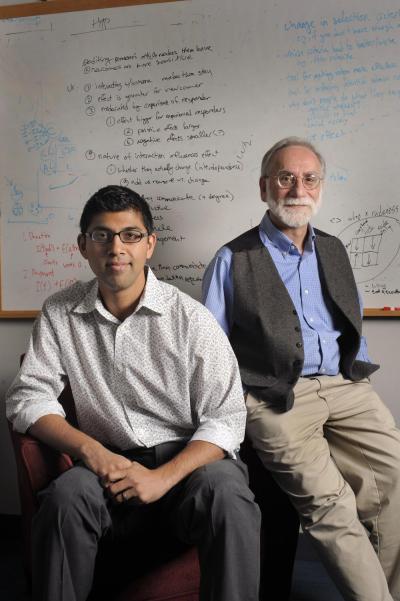"Understanding Online Communities" Earns SCS Allen Newell Research Award

For decades, Herbert A. Simon Professor of Human-Computer Interaction Robert Kraut has studied how people work together — first in actual physical spaces, and later moving into virtual and online communities. His work, and that of his students and fellow faculty collaborators, has resulted in hundreds of papers, countless awards and an increased fundamental understanding of human behavior.
That body of work has also earned the 2016 School of Computer Science Allen Newell Award for Research Excellence.
Awarded annually, the Newell Award recognizes research that epitomizes Allen Newell's research style, as expressed in his words: "Good science responds to real phenomena or real problems, good science is in the details, and good science makes a difference."
This year's award honors Kraut, HCII Associate Professor Aniket Kittur, former HCII graduate students Moira Burke and Haiyi Zhu, and former post-doc Yuqing Ren for their work on "Designing Online Communities."
"The purpose of this research has been to use computer science, social psychology and cognitive science (with contributions from economics and sociology) to understand, at a fundamental level, how online communities work … and to discover mechanisms that improve their staying power, quality and effectiveness," their nomination letter read.
Their research has roots in Kraut's early pre-CMU research, which investigated how virtual interaction and physical distance impacted collaboration. Once at the HCII, he and his students performed groundbreaking work on how the first families to have Internet access at home used that technology, and they were the first to show that the Internet was "a social technology with far-reaching consequences for personal well-being and relationships," their nomination said.
When social media came on the scene, the researchers switched their focus to online communities, which early on seemed to have huge potential for commerce, health, work and everyday life. "The body of work ... has shaped the entire field of what is now called 'social computing,'" the nominators wrote. "It uses systematic, careful methodologies, ranging from online experiments to computational modeling, to learn how online social systems alter behavior and how to improve these systems."
"This award recognizes a superb body of work that was conducted by the team over many years in understanding human behavior at the individual and group level in social media and online communities," said Mahadev Satyanarayanan, Carnegie Group Professor of Computer Science and chair of the awards committee. "The work has led to new ideas, policies and technological approaches for evidence-based design of online communities."
Their work has also inspired a new generation of researchers working in the same field.
"Bob and Niki, and their post-docs and senior grad students, have worked with and trained many other students, who now help design and improve our online world," the nominators wrote. "Based on their research findings, they have identified and evaluated interventions and design ideas to improve peoples' lives."
Story by Susie Cribbs (DC 2000, 2006)

